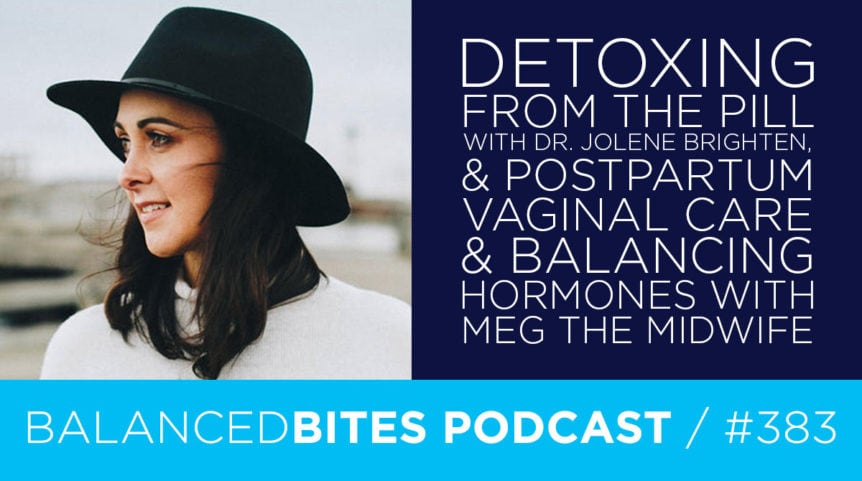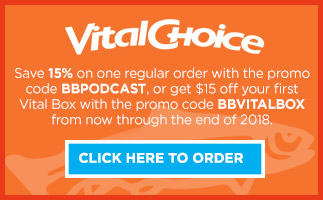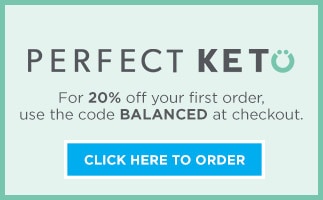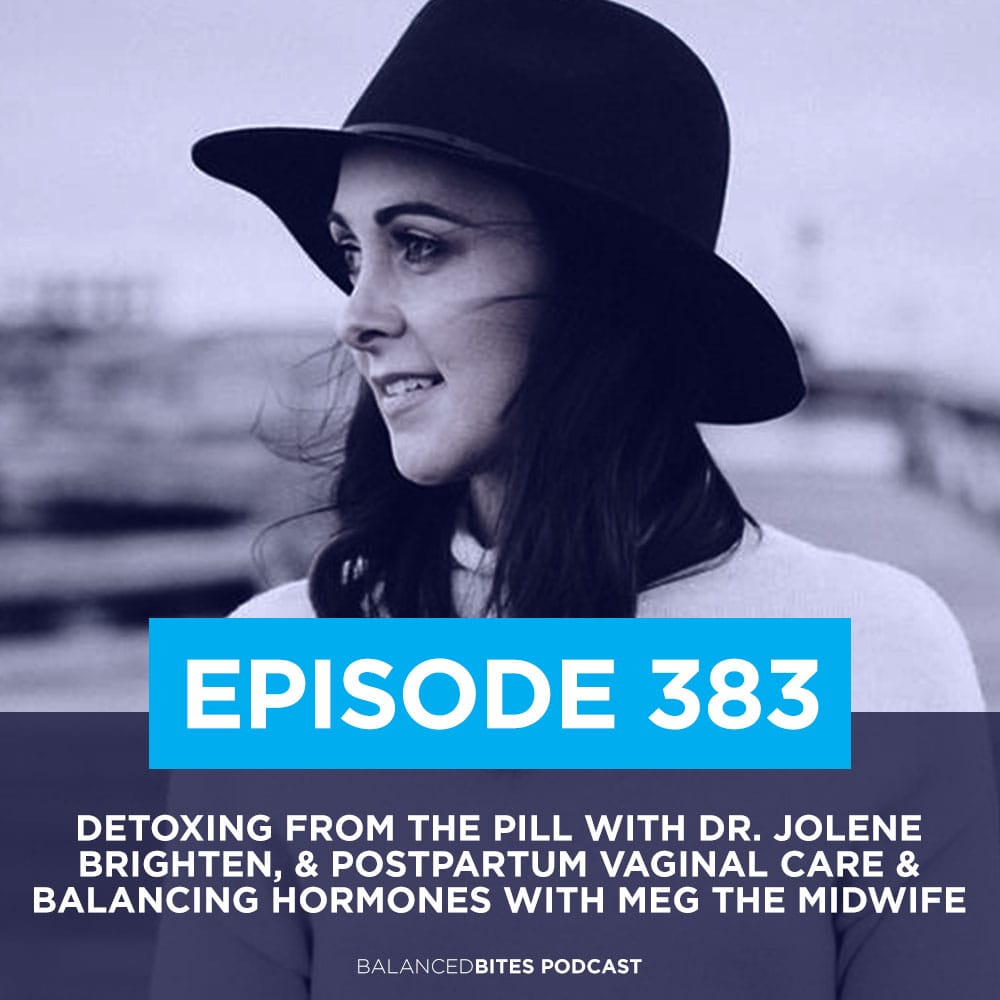 Topics
Topics
- News and updates from Diane & Liz [1:51]
- Part two with Dr. Jolene Brighten: detox from the pill [3:21]
- Re-introducing Meg the Midwife Reburn [8:16]
- Question for Meg: postpartum vaginal steaming [14:38]
- Meg's personal hormone balancing journey [20:51]
The episodes are also available in iTunes, Spotify & Stitcher.
![]()
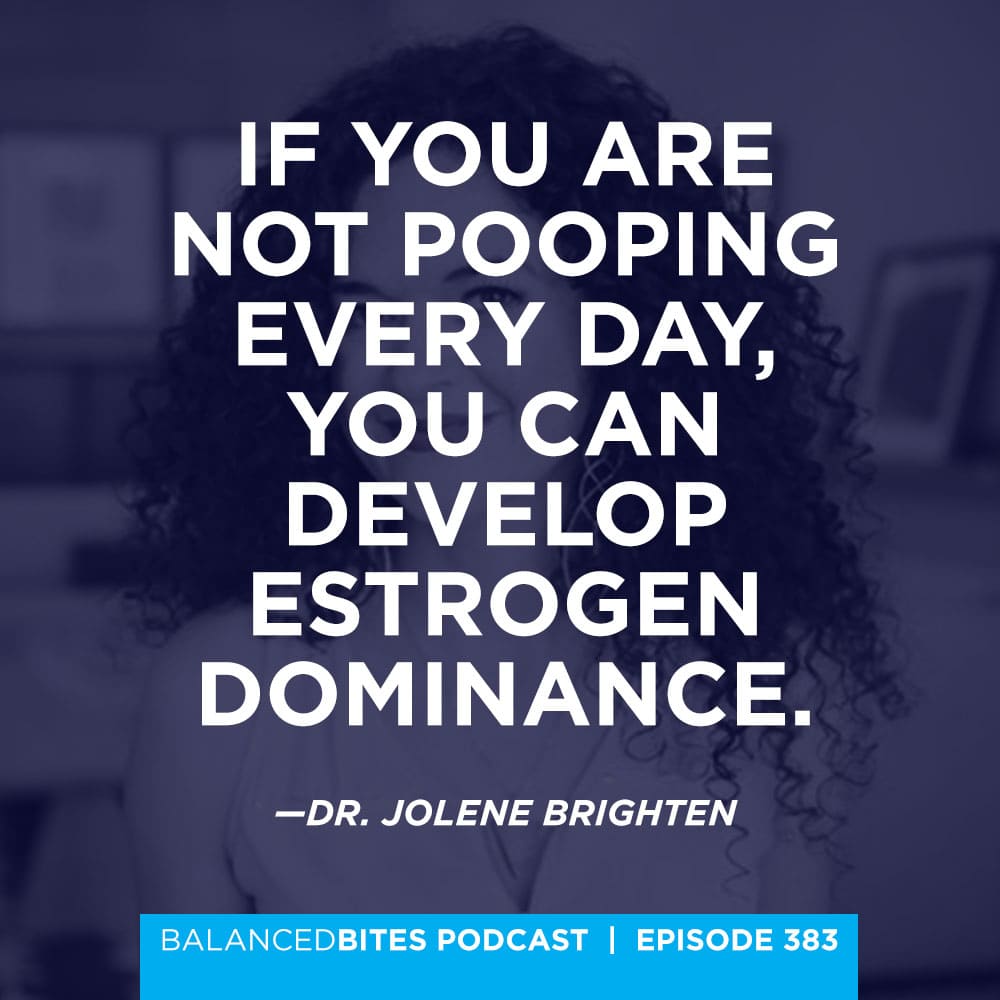
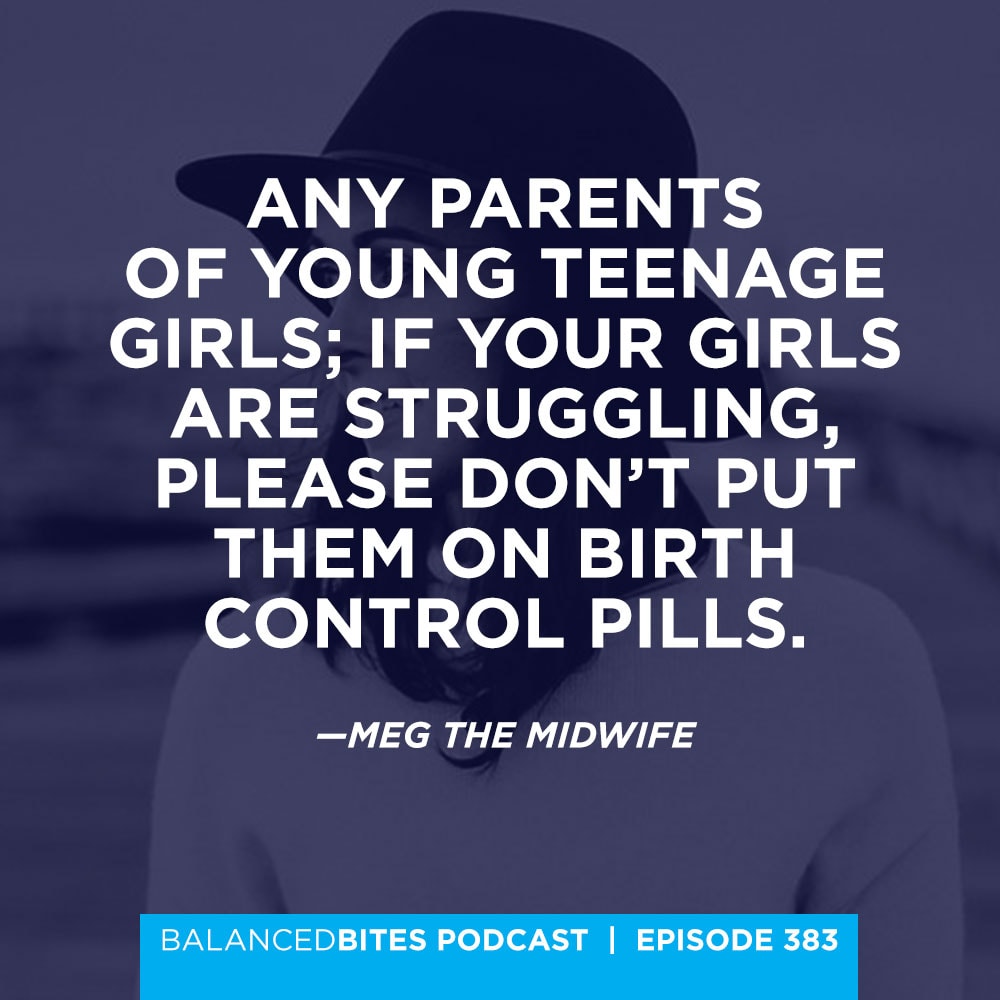
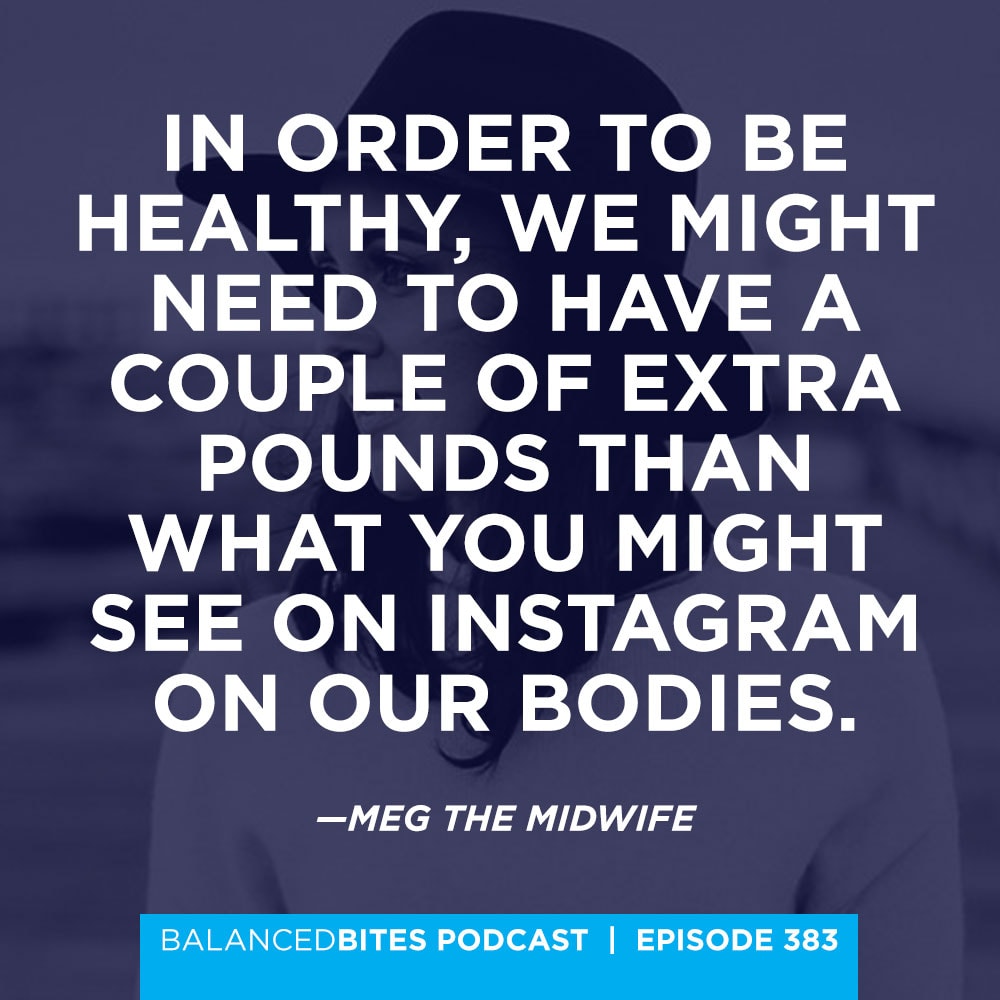
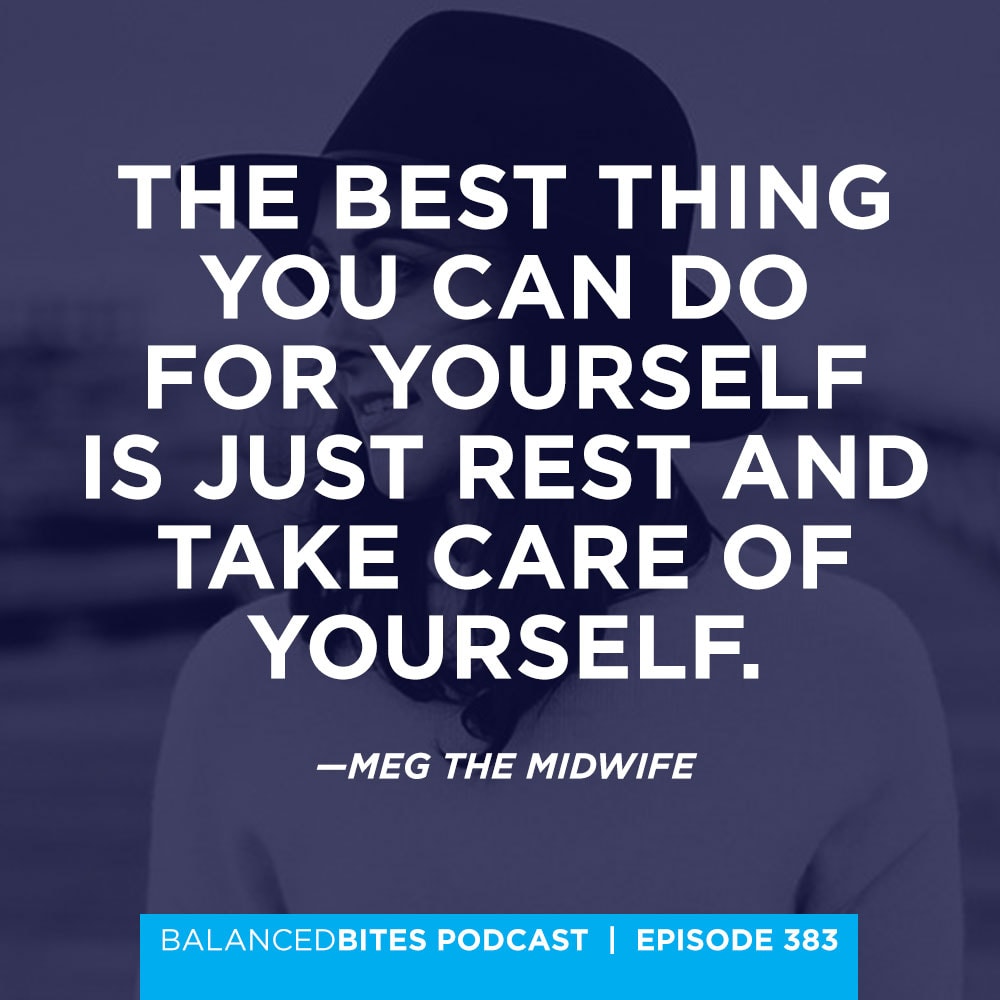
You’re listening to the Balanced Bites podcast episode 383.
Liz Wolfe: Welcome to the Balanced Bites podcast. I’m Liz; a nutritional therapy practitioner, and author of the Wall Street Journal bestseller Eat the Yolks; The Purely Primal Skincare Guide; and the online program Baby Making and Beyond. I live on a lake in the mystical land of the Midwest, outside of Kansas City.
My usual partner in podcast, Diane, a certified nutrition consultant, is the New York Times bestselling author of Practical Paleo and the 21-Day Sugar Detox. Her newest book, Keto Quick Start, released on January 1, 2019. She lives in San Francisco with her husband and fur kids.
We’re the co-creators of the Balanced Bites Master Class, and we’ve been bringing you this award-winning podcast for more than 7 years. We’re here to share our take on modern healthy living, answer your questions, and chat with leading health and wellness experts. Enjoy this week’s episode, and submit your questions at http://blog.balancedbites.com or watch the Balanced Bites podcast Instagram account for our weekly calls for questions. You can ask us anything in the comments.
Remember our disclaimer: The materials and content within this podcast are intended as general information only, and are not to be considered a substitute for professional medical advice, diagnosis, or treatment. Before we get started, let’s hear from one of our sponsors.
Liz Wolfe: Today’s podcast is sponsored by Perfect Keto. Dr. Anthony Gustin and his teams have created a line of supplements that are super clean and effective, no matter what your dietary needs. Diane has been blending their MCT oil powder into my matcha latte lately. Not only are MCTs; medium chain triglycerides; a premium source of your body’s preferred type of energy; they help to fuel your brain and body, but there’s also no added taste. It makes your coffee or matcha wonderfully creamy. Check them out at PerfectKeto.com and use the code BALANCED for 20% off at Perfect Keto; and their sister site, Equip Foods.
1. News and updates from Diane & Liz [1:51]
Liz Wolfe: Alright guys. Just a couple of quick updates. Diane is on tour right now, so go see her. Plus some special guests, like myself. You can go to www.blog.balancedbites.com/tour for all the details and to RSVP. The next stops are Dallas tonight, I believe, then Houston. Back to California for a Los Angeles signing. The Seattle, Washington, Portland, Oregon. Washington DC, Charlotte, North Carolina, Las Vegas, Nevada, Denver, Colorado, and then Kansas City with me, and then Phoenix, Arizona.
So we have Dr. Jolene Brighten back today. This is the second installment of our 5-part series with Dr. Jolene. So make sure you go back and listen to episode number 382 as well. But first, a quick word from one of our sponsors.
Liz Wolfe: Today’s podcast is sponsored by Vital Choice wild seafood and organics. America’s leading purveyor of premium, sustainable seafood and grass-fed meats, and a certified B corporation. This time of year means parties and meals with family and friends, so now’s the time to stock up on deliciously healthy foods you’ll be proud to serve. Vital Choice offers a wide selection of wild seafood, grass-fed meats and poultry, and zesty organic soups. The perfect paleo-friendly fare. And, they make hosting easy with luscious Nova Lox, Alaskan Crab, frozen at sea spot prawns, and much more. Be sure to save 15% on one regular order with the promo code BBPODCAST or get $15 off your first Vital Box with the promocode BBVITALBOX.
2. Part two with Dr. Jolene Brighten: detox from the pill [3:21]
Diane Sanfilippo: Alright, this is the second installment of our 5-part series with Dr. Jolene Brighten. So make sure you go back and listen to the previous episode, as well, where we had Dr. Jolene talking about the problem with the pill.
So, for today’s little segment, I would love for you to talk about how to best detox from the pill. Post-birth control syndrome, and alternatives that you recommend.
Dr. Jolene Brighten: Mm-hmm. So, it’s really important to understand that when we’re talking about going through a detox after birth control, it isn’t because we’re trying to clear all those synthetic hormones out. That’s happening; your body is naturally doing that. But instead, as we talked about; {laughs}, we’ve talked about this lots. So you guys have to go back and listen to all these episodes.
But as we talked about before, the liver has to process synthetic hormones; but your natural hormones, as well. And then there’s the problem that hormonal birth control is depleting the nutrients that your liver needs to do its job. So B-vitamins alone are getting depleted. Selenium is getting depleted. Now we don’t make glutathione, which is an amazing antioxidant. But all of those nutrients are very necessary for the detoxification process.
So when we’re talking about doing a liver detox; and that’s something I have found clinically will turn symptoms around the fastest, is if you love up that liver like crazy. It’s about replenishing those nutrient stores that your liver needs to operate. Bringing in things that we all should be eating anyway. Like broccoli sprouts, other cruciferous vegetables. And please do not get caught up in the goitrogen myth, okay. {laughs} I’m a lady with hypothyroidism, and I eat my cruciferous vegetables daily. You can cook them. You can mash them. You can massage them up with some lemon. There are all these things you do that break down goitrogens, and that’s the way you're going to eat them.
So with that, bringing in those kinds of foods, and then making sure we’re caring for the bowels as well. So this is how it goes; your liver is going to package up that estrogen and get it ready to move out of the body. And then you’ve got to poop it out. That’s one of the main ways we get it out. If you are not pooping every day, you can develop estrogen dominance. Because those little organisms in your gut will reactivate your estrogen, it goes back into circulation, and now your liver is like; what? This again? {laughs} This is more than what I was planning on dealing with.
But also, as we’ve talked about, the gut needs to be loved as well. So that whole detox system works optimally. You can eat sauerkraut, for example. Now we’ve got the cruciferous vegetables, which are supporting liver detox. And they have prebiotics in them. And they’re going to give you some of those nice, rich probiotics. Because hormonal birth control can and does mess with our flora.
So when we’re talking about the liver detox, I definitely; it’s a dietary shift. Food is always foundation. And depending on the symptoms and what’s going on, we’ll also bring in some supplements, as well. There are different liver detox supplements. What you need to look for is that they’re supporting phase one and phase two detox. If they only push phase one, you're going to feel awful and you're going to hate me. You’re going to be like; she told me to do a detox! I feel terrible! You have to support phase one and phase two.
A really big missing piece for a lot of people, they don’t realize. Without protein, we do not detoxify appropriately. So you have to be making sure you're eating high quality protein with an array of amino acids. The easiest way to do that is with animal protein. I know there’s going to be some vegans and vegetarians that are like; you can do that! You can do that. It’s going to be a lot of work. But you can totally do that. But that’s one of the simplest ways, to make sure you are getting protein throughout the day, as well.
Diane Sanfilippo: OK, so in the next segment we’re going to talk a bit about how the pill can affect your mood, anxiety and depression. But what I wanted to just touch on quickly on what you said about loving up your liver and the way that supporting detox. People sometimes roll their eyes. And I think at this point our listeners are probably with it, they understand what we’re talking about with detox. But sometimes people hear the word detox and they think we mean a 3-day juice cleanse. Or they think it’s this hoakie thing, or it’s made up. Or doesn’t your liver just do that already, why do we need to help it?
And the reality is, we all know that we have environmental toxins coming in. We’ve got our normal processes, and then we’ve got these additional insults on top. So, if we’re taking birth control, and it’s lowering some of these nutrients that would normally be supporting liver detox function, and that’s not all happening optimally. And as you said, if you're not pooping, you're not completing the process of detoxification. This stuff needs to get out of the body.
So, I think that’s all really important to know. And I think it’s important to know that we can be empowered to make some of those changes just by eating differently. And then of course some smart supplementation, so I think that’s just very empowering for women to hear.
3. Re-introducing Meg the midwife Reburn [8:16]
Liz Wolfe: As you all can imagine, I’m really, really excited to welcome my Baby Making and Beyond partner. Not my baby making partner, my Baby Making and Beyond partner. The midwife and human extraordinaire, Meg Reburn. So excited you're here, Meg. Welcome back.
Meg Reburn: Thanks so much.
Liz Wolfe: We have gotten some of the best feedback ever on Meg’s podcasts. Meg and I did a few episodes together, probably last year, talking about our project Baby Making and Beyond. Which is currently, as we speak, after this we are going to jump onto a call with our beta testers. Which should be really fun. But it is in its final stages of beta testing, which has gone really great, and we’re excited about it. But we’ll talk a little bit about when the program is actually going to start, here in a second.
But first, for anyone that’s just hopping onto the podcast, and doesn’t know you well. Do you want to give a quick introduction to yourself, my dear?
Meg Reburn: For sure. I’m a registered midwife in Canada. Which means that I deliver babies both at home and in the hospital. Right now I’m taking a little bit of a break from active practice, which we’ll talk about a little bit later, why I’m doing that. But yeah, I’ve been catching babies mostly since 2007. So for a while. It’s going on 12 years now. And I have a natural innate curiosity in women’s health in general. Hormone health. Nutrition. And that’s how you and I connected, originally. My curiosity for that. I really appreciate that. You're interested in the same things.
Liz Wolfe: Indeed. And one of the things I always talk about I think is so great about Canada, and your experience as a midwife, is that you have worked at both home and hospital settings. And there is such a divide in the States about that; it’s kind of like you choose one or you choose the other. And the two never kind of meet in the middle. I think that’s changing a little bit. But it’s just such a huge thing that you bring to the program as far as your expertise. I’m just kind of a mom trying to stay above water at this point. But you have so much expertise in so many different environments, as well as with women and hormonal health. So it’s just been really, really cool to learn from you and to participate in the building of this program with you. You’ve been very, very patient with me, as well. So I have to thank you for that. {laughs}
Meg Reburn: Well you’ve been patient with me, too. Trying to get a new mom and a midwife to do anything within a reasonable period of time is a challenge. But we’re there. We win the award for perseverance, I would say.
Liz Wolfe: I agree with you. And I think we definitely should pat ourselves on the back about that. Very proud of us. Also, really happy with the feedback that we’re getting. I actually had someone, a difficult Megan the other day say, “Wow, I would have paid much more than this for the amount of information that you're putting out there.” And she was specifically referring to the education that you provide on hormones, and hormonal balance, and your cycle, and things like that. So I think it’s going to be a really, really great thing to release to people, finally.
Meg Reburn: Yeah, I agree.
Liz Wolfe: Should we have a little preview; we got a question that came in to you about when the program actually starts.
Meg Reburn: {laughs}
Liz Wolfe: We’re talking about our fertility, pregnancy, parenthood program. Baby Making and Beyond. When it’s actually going to be open for anyone and everyone to jump in. So what do you think, Meg? {laughs}
Meg Reburn: Well, you know, we’re closer than we’ve ever been.
Liz Wolfe: {laughing}
Meg Reburn: We’re just in the final stages of editing these massive documents. And when I say massive; these are 20,000-word documents at a time so we want to make sure that things are edited properly and all of the information is properly reference. So that’s why it’s taking a little bit longer. Those things just take a little bit of time. But I think our goal and our objective would be to have things out to you certainly before March of this year.
And it might not mean that all of the program launches all at once. I think as information changes, which it does in the realm of science, that’s the beauty of having an online program. We can just go, and we can admit perhaps what we got wrong, or we can add more information in as it changes, and as clinical practice changes, and as we begin to learn more.
So I would say that the program will hopefully be launched by February of this year; that’s 2019.
Liz Wolfe: Yeah.
Meg Reburn: And more stuff will be added as it comes in. And people who purchase the program will have access to that.
Liz Wolfe: Yes. And we’ve gotten; our beta testers are currently reviewing our core four. Which we’ve talked about before a little bit on the podcast. It’s nutrition, exercise and movement, sleep, and stress. Which are the four things that translate to all different phases of life. Whether you're looking at your fertility health or preconception, pregnancy or postpartum. All of these things are really, really important ways to support your body in just the basics.
And then once we release, we would hope mid-February, but hopefully we can surprise people and get it done a little earlier than that. But we will be tacking on all of your amazing wisdom for fertility, pregnancy, postpartum and the hormone realm, and then what I have to say about parenting, as well. So it really is going to be an encyclopedia. But a very accessible, enjoyable, easy to read one. {laughs} And as we continue to work on the audio files and all of that stuff.
I think we wanted it to be perfect, but we’re going to call this perfect, because it is. And we’re going to add on all that extra icing as we go with the audio files and all that good stuff. So, people should feel free to get excited, I think at this point.
Meg Reburn: Yeah. I’m excited. Right now, currently in my life, this is my primary focus right now. We’re working many hours a week trying to get this out to everyone.
Liz Wolfe: Yes. We’re on Voxer all day long, guys. All day long. Voxer is the best.
Meg Reburn: It really is.
4. Question for Meg: postpartum vaginal steaming [14:38]
Liz Wolfe: ok, let’s do a quick question. We always have questions that come in for Meg, but we’re going to focus most of today’s episode on a personal journey that Meg has been on recently, and kind of share what she’s been navigating. I think people are going to be really interested in it. But first, we just had to ask you a fun little question.
Meg Reburn: {laughs} Ok.
Liz Wolfe: Ready? {laughs}
Meg Reburn: Go for it.
Liz Wolfe: Ok. “Meg’s thoughts on vaginal steaming for postpartum recovery?” Do you have thoughts on this very important topic?
Meg Reburn: Well I have thoughts on absolutely everything, so that’s not hard. So for people that have not heard of this, vaginal postpartum steaming is kind of the new trend in postpartum recovery. And what it involves is getting kind of a really, really hot steamy bowl of water, mixing in a bunch of herbs. Quite a significant amount of herbs, up to one to two cups of herbs. So it’s a potent brew, I should say.
Liz Wolfe: Will you say “herbs” a couple more times, please?
Meg Reburn: Herbs. Do I sound like a Canadian?
Liz Wolfe: Yes you do! {laughs}
Meg Reburn: {laughs}
Liz Wolfe: So great.
Meg Reburn: Well, I’m just going to own that. So these herbs that you add into this steamy bowl of water are usually the healing herbs that have traditionally been used to offer some healing and detoxifying sorts of properties. So things like calendula is a really popular one. Mugwort, which is used in Chinese medicine. Some ginger is often thrown in there. So lots of different things.
And what you do is you kind of squat over this hot steamy bowl, put a towel around you to capture the steam. And the thought is that the steam will rise, cleanse your uterus. Cleanse your whole vaginal area. And help provide quick healing in the postpartum.
So, some people really swear by this. From a scientific perspective, it really offers no grand benefit. Theoretically, having a hot steamy environment is kind of a place that bacteria and things like yeast might enjoy growing. So there is the possibility that if you're doing it too much, you could encourage bacteria and yeast to grow a little bit more. The idea that it works its way up into your uterus doesn’t make a lot of sense to me. Your cervix is closed shut by that point in time. It would just not make its way up there.
However, the steamy warm heat could help relax postpartum cramps. It could help give you some relief from the cramps, so that definitely could have some efficacy. And we know that sitz baths; so not squatting over a steamy bowl, but actually sitting in a bowl of warm water, often combined with herbs and Epsom salt, can be quite healing to your tissues postpartum. And that’s something that midwives and physicians will recommend in the postpartum.
So, it could kind of act like a steamy sitz bath. We don’t really know. Are there any studies done on vaginal steaming that say it’s 100% harmful or helpful? No. If you want to try it, go for it. But don’t feel like it’s one of those things that you have to do. And certainly, if you have tried it and you found it helpful; or you found it harmful. That’s something we love to know at Baby Making and Beyond. You can always send us an email with your thoughts. And we’d love to add that in. It’s something I’m trying to learn more about. There’s not a lot of information on it. But yeah, it’s definitely out there in the world these days.
Liz Wolfe: So interesting. And I feel like it’s kind of part of that; I don’t know, cult of wellness. Where it’s like; herbs in everything. When you were talking about using this as a quick healing type of thing; isn’t that kind of antithetical to the way herbs are used in the first place. And also the way we want people to think about healing postpartum? Where it’s like, we really need you to take the time to do this.
And if you're using herbs, use them in a responsible way that’s maybe better known to work. I think Chinese medicine has an incredibly; an amazing grasp on the use of herbs and things like this. You can see an acupuncturist or a Chinese medicine practitioner, and maybe use herbs in kind of that gradual way that augments healing, versus expecting to sit over a steamy bowl of calendula and then all your problems are solved. {laughs}
Meg Reburn: Yeah, exactly. {laughing} But I think taking the time for yourself is going to be paramount to your healing, regardless of how it happens.
Liz Wolfe: Such a good point. I think a lot of times with this type of thing; it’s not the jade egg you're putting in your vagina. It’s the fact that you're going to a place full of supportive, loving women in a calm environment for 30 minutes and sticking a jade egg up your vagina.
Meg Reburn: Totally.
Liz Wolfe: Alright. Good little warm up there. Let’s hear from our final sponsor.
Liz Wolfe: The Balanced Bites podcast is sponsored in part by the Nutritional Therapy Association. The NTA trains and certifies nutritional therapy practitioners and consultants (including me; I’m an NTP), emphasizing bio-individuality and the range of dietary strategies that support wellness. The NTA emphasizes local, whole, properly prepared nutrient dense foods as the key to restoring balance and enhancing the body’s ability to heal.
The NTA’s nutritional therapy practitioner program and fully online nutritional therapy consultant program empower graduates with the education and skills needed to launch a successful, fulfilling career in holistic nutrition. Registration is now open for February class, and you can learn more and save your seat by going to http://www.NutritionalTherapy.com. Don’t forget to check out the NTA’s annual conference, Roots, happening March 1 through 3 in Portland, Oregon. It’s one of the most empowering and educational holistic nutritional events of the year, and all are welcome.
5. Meg’s personal hormone balancing journey [20:51]
Liz Wolfe: Ok. So what we want to talk about now is the personal journey that Meg has been on for quite some time, that she just alluded to. Let’s talk about your personal journey of hormonal healing and recovery. Tell us all about it.
Meg Reburn: Oh, that’s a great question. It’s something that I get a lot of questions about. And luckily, I’m a totally open book. So I’m really happy to share.
So, I guess if we were to really turn back time. And we won’t go all the way back in time, just for the purpose of the fact that this isn’t a 3-hour podcast. My hormones, right from the onset. So when I was just a young teenager, were quite wonky. As they often are with young teenage girls. And the reason for that is when you first get your period as a young woman, your body is just developing different estrogen and progesterone receptors. Your body doesn’t know what to do with all of these hormones yet. So oftentimes, young women will experience more intense PMS. They might get heavier bleeding. They might have all these different symptoms that might take them to their family physician. And back in the 90s, they would just put you on birth control pills really young, to try to “regulate” your cycle. And that’s exactly what happened to me.
So, right from the onset, my body didn’t really know what to do with hormones. I was on birth control from the ages of 14 to almost 20. So it didn’t set the stage for a happy hormone environment. Which now I think we know a little bit better, and it’s not done as often. But it still is done. So I would encourage any parents of young teenage girls; if your girls are struggling, please don’t put them on birth control pills. Because all they need is a good old tincture of time, and the body will sort itself out. So that’s a bit of a side note, but I thought I might add it in there. Because it’s something I’ve done a lot of research on recently.
But, my kind of journey started back in 2007. So a long time ago. I was in the midst of my clinical rotations as a young midwifery student. So struggling a little bit with sleep and circadian rhythm. Anyone who has ever done a bunch of clinical rotations or work that involved night shifts or a lot of on-call, and for me, we had 48 hours off per month as midwifery students. So we were on-call most of the time. And going to all the births all the time.
So you set the stage where your sleep is compromised, and you're in a high-stress environment. And then all of a sudden, quite suddenly, my fiancé passed away. And I was just launched into immediate fight or flight and struggled with that while I was in the midst of all of these clinical rotations. So my body responded by completely losing its period, as it does for many, many women who are in stressful situations. The body prioritizes survival, not reproduction. And your periods shut down.
It didn’t help the situation that the way that I coped with the loss of my partner was to restrict food. I felt like, at that point in time, it was the one thing in my life I could control. I couldn’t control my schedule. I couldn’t control my sleep. But I could control what I ate, and somehow that offered me some comfort. I also kind of self-medicated with movement. So I exercised my brain off to try to get some feel-good endorphins going. And so all of these things kind of compounded the hormonal disaster that happened in my body.
And my period disappeared for, oh gosh, a solid 10 years. And I think when you and I first met, Liz, I was still in the deep heat of that.
Liz Wolfe: Yeah. I think even when you visited my house, in Missouri, potentially. I think we talked about a little bit, as well.
Meg Reburn: Yeah, when I visited you on the farmstead, we talked about that. I was in the depths of it. Over the 10 years, I’m curious. And I will try pretty much everything. And I did try pretty much everything to get it back. I mean, I tried every supplement known to man. I tried a full solid year of acupuncture. I tried literally everything. I tried to exercise a little bit less. I tried to exercise a little bit more. I tried to only eat things like greens, and liver. And I tried to go keto. I tried to go just low-carb. I tried to go high carb. I tried everything.
But at the end, basically I was avoiding the fact that what was really going to work was to pay good attention to my sleep habits, and pay good attention to actually not what I was eating but how much I was eating. And not what I was doing, but how much I was doing. And those seem to be the really key things for recovering your periods if they get out of balance.
So for me, the turning point happened in 2016 when I had a really bad accident rock climbing and was confined to crutches and bed for 12 weeks. All of a sudden, my hormones started coming back into balance. I couldn’t practice as a midwife, so I was sleeping every night. I couldn’t exercise, so the calorie deficit that I experienced just due to the fact that I move so much was decreased pretty significantly. And slowly, my hormones started to come back.
So it kind of gave me the kick in the butt, so to speak, that I needed to really jump start the healing process. And also, having your life flash before your eyes really can change your perspective on what’s important. Around the same time, I had a bone density scan done. My mom and my grandma all have osteoporosis, and I was diagnosed with early onset osteoporosis in my mid-30s, which is absolutely ridiculous and unacceptable in my mind. Because it was something I created myself.
So I really took the bull by the horns, so to speak, and put a solid 6 to 9 months of rest, sleep, and recovery into my program. That meant making some really hard decisions. It meant leaving clinical midwifery practice. Because I found that for me, the big piece was the circadian rhythm piece. So after 10 years of trying all the other things, I hadn’t tried to take a break from my job. And that can be a really difficult decision, both financially and emotionally. Oftentimes our entire self-image and self-worth is wrapped up in what we do.
So I took a break. I ate a lot more. I exercised less. I didn’t let go of exercise completely, because for me that’s just part of my culture. I live in a mountain culture. At that point in time, I was dating a mountain guide, and it was pretty much impossible not to move. And I did eat a lot more. And as my body adjusted to all of those things, my hormone levels started to come back up. My estrogen rose first. My body just gained about 20 pounds in 3 months. So obviously, it was just desperate to hold onto extra weight. And all of a sudden, I got my period back.
It certainly wasn’t the end of it. When I got my period back, it wasn’t like; oh great! I got my period back. Everything is good! {laughs} For people who struggle with loss of their period, it can take a lot longer for you to truly be recovered. For me it took an additional year. My body continued to put on fat mass, which is what it needed to feel safe. I think in our culture of the Fitspo, we compare ourselves to different women on Instagram all the time. We look at what they’re doing. We look at how they look and how their bodies look. It’s hard to accept the fact that in order to be healthy, we might need to have a couple of extra pounds, and a little bit more of a layer than what you might see on Instagram on our bodies. And for me that certainly was the case.
And then there’s the emotional piece of coming to terms with all of that. Accepting yourself and how your body looks, and how your body needs to look in order to be healthy. And for me, that took a little bit of time. I certainly have worked with women for years who have gone through the same things. And I can say all the right things. I can tell them to love themselves, and accept themselves. And theoretically I know all these things. But in order to actually live those things, that’s a whole different kettle of fish. But I’m happy to say that I eventually did get there. And for me, it was just the tincture of time. It just took me a little bit longer to accept all those things.
And then the other big piece; when you get your period back, you might get your period back but you might not be ovulating every month. And in order to have a truly balanced hormone profile, you need to be ovulating every month; and if not every month, certainly most months. Not every woman ovulates every single month. So that also took a little bit of time to figure out, and for my body to adjust to learning how to ovulate again.
There are a lot of questions about how I did that. How I did that; I don’t really, it’s hard to tease out exactly what it was that made a difference. But for me, I really think the big piece was the circadian rhythm piece. And I know we talk a lot about this, and you’ve done a lot of research, Liz, for Baby Making and Beyond about sleep, circadian rhythms, and I know today on our call with our beta testers we’re talking a lot about the benefits of melatonin.
Liz Wolfe: Yeah.
Meg Reburn: As I went through the progress of my hormone recovery, I did lots of things. I would all of a sudden be like; you know what? I’m going to take up running again. My foot feels so much better after the accident, and I’m going to run 100 miles a week. And I did that, and I still ovulated, and I still had my period. And I thought; huh. Isn’t that interesting? The thing that stayed consistent all throughout that was my sleep. So I prioritized sleeping. I prioritized going to bed before 11.
If I didn’t feel good, I prioritized rest. And for me, that was a really huge piece to balance my hormones. It wasn’t the supplements I took. And trust me, I took a lot of supplements. It wasn’t the foods that I ate. It was how I cared for my body. And that’s the piece that I really want to get across to people. Because all of these supplements and diets and quick fixes are sold to people as products. And at the end of the day, a lot of the time, the best thing you can do for yourself is just rest and take care of yourself. And that’s completely free. And I think it’s often the thing that’s overlooked. Because you can’t package it in a pretty bottle. And it’s not the easy thing to do. You can’t just pop a pill and make it better.
Sure, there are some supplements that maybe helped. I don’t know. But when I really look back at it all, I see that as being the key piece. And that’s the key piece moving forward, when for me when I miss a month of ovulation, I look back and I see that some of those things got compromised.
Liz Wolfe: One of the things we did for Baby Making and Beyond betas was to kind of fold together the sleep and stress modules into one kind of feedback period. And those that aren’t betas kind of maybe are not familiar with how we’re doing this beta process. But it was really kind of an easy decision to say that those things go hand in hand. So the sleep stuff causing stress on the body, and then stress causing loss of sleep.
But one of the things we’re going to talk about, like you said, is the circadian rhythm stuff, and melatonin as a really powerful antioxidant that is known to be important in fertility. But I think one of the things that we learned, even through the review process, is that people are really the most interested in the food stuff. When really it’s not the most important part. Exactly what you said. But how do we really get people to buy into that? Because it is so much easier to just say; yeah, I can take a handful of supplements. I have no idea how I’m going to fix my sleep.
Meg Reburn: Yeah, totally. And the thing to remember; and I think I’ve said it before. Supplements are supplements. They supplement all the other things that you are already doing. They can help you get the extra 10% of the way. But the vast majority of it is your habits. So the things you do every day that tell your body it’s safe, and it’s ok.
I think the really cool thing, when I was doing all the research for Baby Making and Beyond and the fertility and the hormones piece is that I really took the time to breakdown all the different feedback loops in your body. So looking at the axis that connects your gonads. The HPG axis. So that would be your progesterone levels and if you ovulate or not, and how much estrogen you have or don’t have. And then linking that to the thyroid axis. So is your thyroid low? And then linking that to the HPA axis, your adrenal axis.
And what I’ve found through all the research is that all of these “problems”, they don’t exist on their own. If one thing is out of balance, they’re likely all going to be out of balance. And focusing your attention on just fixing one piece. Say, for example, I get a lot of women come to me who are struggling with estrogen dominance. Which often isn’t a problem of too much estrogen, it’s usually a problem of too little progesterone.
So you look at those women, and often times their treatment plan has been focused around just decreasing estrogen, or increasing progesterone. And not really looking at the other pieces. So not looking at the stress component, or the thyroid component. And what is absolutely incredible when you look at all the research about how to help rebalance these things, it’s that the key piece is rest, sleep, and recovery. For all three of those things.
So if you focus in on just the rest, the sleep, and the recovery, your hormones from all of those different systems will begin to rebalance. When you rebalance your whole system, all of those hormones start to work together a whole lot better. And that’s what I’ve found, personally. I’m pretty nerdy. I track my hormones. And I have these super dorky journals about what I did, and how things changed. Because I’m trying to use a bit of scientific method as to how to figure out how to ovulate consistently and be a healthy human. That’s just the nerdy side of me.
So what I’ve noticed; and I’ve been also tracking them with other measurements. So I do my DUTCH panel every 6 months, just to see how things are changing. I take my temperature every day. And I have graphs to show a temperature rise after ovulation. And I have found consistently that the more I focus on that sleep, rest, and recovery, the more my thyroid functions better. The more often I ovulate. And the more balanced my cycles are. It’s quite amazing.
Liz Wolfe: Well I feel like we could have like 3 or 4 shows just devoted to this. And maybe we actually should. So maybe we’ll have to bring you back on to talk about it more.
Meg Reburn: And I’d love to hear what people are particularly interested in. Because I’ve got a full gamut of information. Most of my research is mostly evidence-based, but a little bit anecdotal, too, because I’ve been through it myself. I’ve tried everything. {laughs} But the cool thing is that I’m finally there, the last 9 months of my life have been very balanced, and I’ve been ovulating every single month, and I’ve been sleeping through the night. It’s quite miraculous. So it’s cool when you finally do all these things and they actually work.
Liz Wolfe: Well folks, give us some feedback on what you’d like to hear Meg talk about most in an upcoming episode based on her experience and what you’ve heard today. Let us know through the Balanced Bites podcast Instagram account, or message Meg or myself directly. And we’ll get together some future episodes.
Meg Reburn: Yeah, it’s awesome. And a lot of that info will be in the Baby Making and Beyond program, so I encourage women. Even if you're not pregnant, or considering pregnancy in the next 6 months. It’s going to be a really cool program just to learn more about your body as a woman. And if you're thinking of having babies in the next 3 years or so, it’s really good reading on its own.
Liz Wolfe: Indeed. Well thanks for listening to this episode, folks. You can find me, Liz, at http://realfoodliz.com/. Where do you want folks to find you, Meg?
Meg Reburn: You can find me on Instagram at Meg the Midwife. That’s probably the best place. Or my website at MegReburn.com.
Liz Wolfe: Perfect. And you can find my usual cohost, Diane, at http://dianesanfilippo.com. Please join all of our email lists and the Baby Making and Beyond list. Go to BabyMakingandBeyond.com and scroll down to get a little freebie before the program officially opens again. While you’re on the internet, if you leave the Balanced Bites podcast an iTunes review, we would greatly appreciate it. We’ll see you next week.

